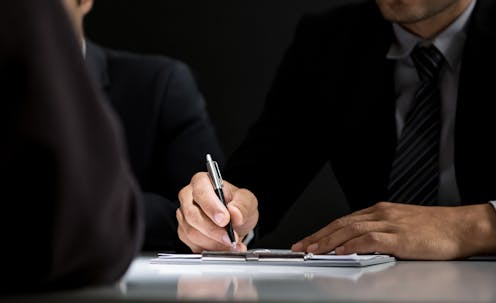Australia’s professional services sector is being used to launder money. It’s time for tougher laws
- Written by Jamie Ferrill, Senior Lecturer in Financial Crime Studies, Charles Sturt University

Australia’s stable political and legal systems – and relatively resilient economy – make it an attractive place to do business.
But they also make it an alluring place for criminals to launder ill-gotten gains, heightened by the fact our anti-money laundering regulations are not up to par.
In a joint address[1] to the National Press Club on Tuesday, Attorney-General Mark Dreyfus and Australian Transaction Reports and Analysis Centre (AUSTRAC) chief executive Brendan Thomas jointly announced the release of two new national risk assessments on money laundering[2] and terrorism financing[3] in Australia.
This followed the closure of a second round of consultation[4] on anti-money laundering and counterterrorism financing reforms last month.
Dreyfus and Thomas painted a bleak picture of a country not only fraught with vulnerabilities to criminal activity and money laundering, but also lacking adequate controls to curb them.
What is money laundering?
Money laundering is the process of cleaning “dirty” money.
Dirty money typically refers to the proceeds of crime, which could include drug trafficking, tax fraud, corruption and bribery, or scams.
Money generated through crime typically can’t just be spent by the criminals involved. Simply depositing it in a bank would set off all kinds of alarms.
Criminals need to make it harder for authorities to trace it back to them, so they use a range of methods to launder it. Put simply, they attempt to make it seem like legitimate income.
This could be by buying real estate, funnelling funds through shell companies, depositing small amounts into various bank accounts, or gambling with it at casinos.
Today’s address[6] highlighted that many of these money-laundering methods are often enabled by corrupt or unwitting professional service providers, including legal practitioners, accountants, consultants, trust and company service providers, financial advisers and real estate professionals.
These are known as “gatekeeper entities” because they act as intermediaries who can control access to certain services or information that criminals can use to launder money.
Regulations aren’t up to scratch
In Australia, these gatekeeper entities are not currently covered under the anti-money laundering and counter-terrorism financing regime, making us one of only a few countries neglecting this huge vulnerability.
Coincidentally, on Tuesday, the global anti-money laundering and counter-terrorism financing watchdog the Financial Action Taskforce (FATF) also released a report[7] reviewing gatekeepers’ “technical compliance related to corruption”.
Australia, China, and the United States all scored 0% on requirements to cover gatekeeper sectors, putting all three at the bottom of global rankings.
According to the report, in our case this is largely because:
In Australia, these sectors are required to implement none of the preventive measures that have been required by the FATF Standards since 2003.
A recipe for criminal exploitation
AUSTRAC’s risk assessment[8] ranked domestic real estate, luxury goods, and cash (as both transfer and store of value) as “very high risk” channels or sectors for money laundering.
Accountants, lawyers, precious metals, and legal structures were all ranked “high risk”. These sectors could be playing a role in better controlling money laundering in Australia. Instead, they are currently passive, and sometimes active, enablers.
In rankings of proceed-generating crime threats, illicit drugs, tax and revenue crime, and government-funded program fraud were identified as the highest-risk. The proceeds of these crimes are known to be laundered. Careful laundering can allow criminals to keep using that money with impunity, fueling further crimes.
Bring those two sets of risk ratings together, and it’s clear Australia has both highly profitable criminal activity and a range of sectors highly vulnerable to money laundering abuse. That is a recipe for criminal exploitation.
There’s an appetite for change
The national risk assessments are out at a useful time. Tranche II reforms[9] to update Australia’s anti-money laundering and counter-terrorism financing measures are in progress. In the last budget, A$166.4 million [10]was set aside to implement the necessary reforms.
Under these reforms, a wide range of gatekeeper businesses in Australia will be required to develop an anti-money laundering and counter-terrorism financing program. Organisational risks will need to be assessed. Suspicious transactions will need to be reported. Awareness and education about money laundering through these legal channels will undoubtedly result.
The national risk assessments were a significant undertaking by AUSTRAC. They provide an evidence-base for the money laundering and terrorism financing risks we face in Australia.
As noted[11] by AUSTRAC chief executive Brendan Thomas, Australia’s strong business sector is appealing to both legitimate and illegitimate business. Criminals are good at exploiting weaknesses, so the controls to slow them must be stronger.
An effective anti-money laundering regime is the best tool we can have to control flows of dirty money. While we will never completely eradicate it, we can certainly do a better job of detecting, deterring, and preventing the abuse of legal channels in Australia.
Our government has had 17 years since passing the Anti-Money Laundering and Counter-Terrorism Financing Act to bring the legislation up to the minimum standards set by the global Financial Action Task Force. So far, it has failed to deliver. Not only does this leave gaping holes for criminals to exploit, but it also means we are not collecting data on suspicious transactions within these gatekeeper industries.
Read more: Australia is awash with dirty money – here's how to close the money-laundering loopholes[12]
References
- ^ joint address (iview.abc.net.au)
- ^ money laundering (www.austrac.gov.au)
- ^ terrorism financing (www.austrac.gov.au)
- ^ consultation (consultations.ag.gov.au)
- ^ Mick Tsikas/AAP (photos.aap.com.au)
- ^ Today’s address (iview.abc.net.au)
- ^ released a report (www.fatf-gafi.org)
- ^ risk assessment (www.austrac.gov.au)
- ^ Tranche II reforms (www.grantthornton.com.au)
- ^ A$166.4 million (ministers.ag.gov.au)
- ^ noted (www.austrac.gov.au)
- ^ Australia is awash with dirty money – here's how to close the money-laundering loopholes (theconversation.com)
Authors: Jamie Ferrill, Senior Lecturer in Financial Crime Studies, Charles Sturt University














